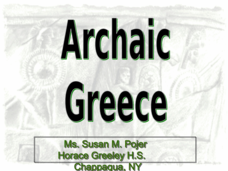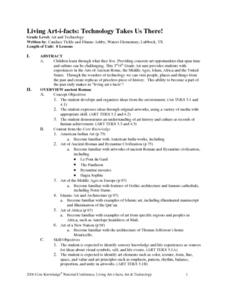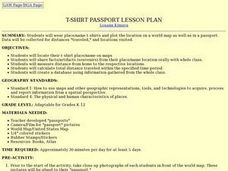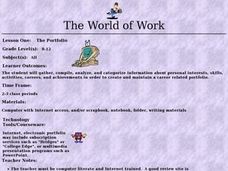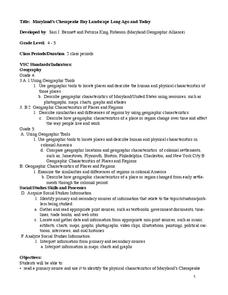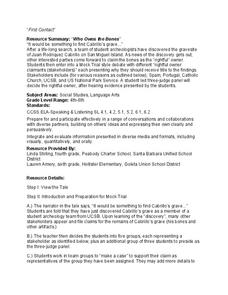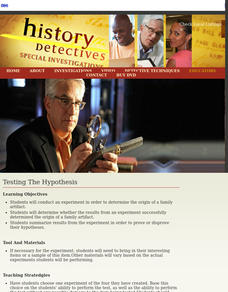Curated OER
What Can We Learn From the Past?
What would future archeologists learn from your scholars' personal belongings? Have them bring in a box of "primary sources" from their home. Discuss the difference between observations and inference, using some of your own items to...
Curated OER
Archaic Greece
What could be so interesting about archaic Greece? What isn't! Kids will get a chance to see some of the amazing artifacts unearthed by explorers of old. As the slides progress, so does the ancient timeline. From the Early Bronze Age and...
Odyssey of the Mind
Odyssey of the Mind Curriculum Activity: Digging for Clues
Make critical and creative thinkers out of your class, with an archeology-based project they'll love. They start the activity by first researching what archeologists do, then they generate a list of the qualities archeologists need to be...
Curated OER
Lesson: Snake Handling
Are the studies of art and archeology connected? You bet they are! Young scholars research the ancient temples of Mexico by visiting an archaeology site. They describe the various temples they see, taking note of shapes, stairs, details,...
Curated OER
Living Art-i-facts: Technology Takes Us There!
Students create living artifacts dealing with different times and cultures. They explore Ancient Rome, the Middle Ages, Islam, Africa, and the United States.
Curated OER
Lesson Plan: Carving Through History
Peek into the art and history of ancient Mexico by analyzing the artifact Stone Serpent Heads. Learners examine images of the piece, discuss its origin, history, and significance. They experience the carving process by creating similar...
Smithsonian Institution
POWs
Why did Vietnam POWs and their families receive more media attention than POWs in previous wars? To answer this question, class members view artifacts, read articles, and engage in class discussion. Individuals then assume the voice of...
Smithsonian Institution
General George Washington, Military Leader
Teach pupils the characteristics that make George Washington such an effective leader, especially in context of his time period. Scholars view artifacts, participate in group work, create lists, compare and contrast, and discuss as a...
Smithsonian Institution
The Price of Freedom: Americans at War
An interactive resource covers all of the United States' most prominent and influential historic wars including the Vietnam War, the Cold War, the War of 1812, and the Korean War. Learners observe cause and effect as well as how violence...
Curated OER
Interpreting History With Artifacts: Mid to Late 1800s
Fourth graders study history though the exploration of artifacts. In this Civil War lesson, 4th graders examine artifacts such as sweet grass basket, spinning top, photos on tin, cast iron kettle, china"bone plate," bonnet, wooden carved...
Curated OER
Artifact Classification
In this artifact classification worksheet, students are given a list of key terms and two activity sheets about classifying artifacts of the Pee Dee culture. Kids analyze artifacts and group them to answer questions on the classification...
Curated OER
Ancient River Civilizations Jigsaw PowerPoint
Ninth graders use captions to determine an artifact's function and to list the features of a civilization. They classify artifacts according to the 8 Features of Civilization and for each Feature of Civilization they locate one artifact...
Curated OER
Healing Art: Health and Illness
Students examine African artifacts relating to health and illness
Curated OER
T-shirt Passport Lesson Plan
Students locate their t-shirt place/name on maps, then share facts/artifacts (souvenirs) from their place/name location orally with whole class. They create a database using information gathered from the whole class.
Curated OER
"Archeology Dig"
Students simulate archaeologists as they dig through a bag with found items in order to arrive at conclusions about the people they are studying.
Curated OER
Ancient Artifacts
Students research the earliest Americans. For this ancient civilizations lesson, students investigate the Mayas, Aztecs, and Incas. Students examine artifacts used in the cultures and then determine what the artifacts were used for and...
Curated OER
The World of Work: The Portfolio
Students compile information to include in their career portfolio. In this portfolio lesson, students view example portfolios using the given website and identify the portfolio components. Students gather and compile artifacts for their...
Mississippi Department of Archives and History
Protesting Violence without Violence
The ultimate legacy of Emmett Till's violent death is its role in the non-violent roots of the Civil Rights Movement. A lesson compares contemporaneous articles with the lyrics of Bob Dylan's "The Death of Emmett Till" and prompts...
Curated OER
Maryland’s Chesapeake Bay Landscape Long Ago and Today
Combine a fantastic review of primary source analysis with a study of Captain John Smith's influence on the Chesapeake Bay region in the seventeenth century. Your young historians will use images, a primary source excerpt, and maps...
Center for History and New Media
The Impact of the Jim Crow Era on Education, 1877–1930s
Even though American slaves were officially emancipated in 1865, the effects of slavery perpetuated throughout the 19th and 20th centuries. Middle and high schoolers learn about the ways that discrimination and the Jim Crow laws...
Channel Islands Film
Who Owns the Bones
A study of the history of the Channel Islands, located off the coast of southern California, continues as class members conduct a mock trial to determine which group of stakeholders should have the right to claim the remains of Juan...
Channel Islands Film
Sa Hi Pa Ca (Once Upon a Time): Lesson Plan 2
What tools do archaeologists and anthropologist use to learned about what life was like in the past. After watching West of The West's documentary Once Upon a Time that details how scientists use artifacts to establish a history of the...
PBS
Testing The Hypothesis
After choosing one experiment from the four they conducted in the previous lesson, young investigators analyze the evidence they collected to determine if it proves or disproves their original hypothesis.
Channel Islands Film
Arlington Springs Man: Lesson Plan 3
Imagine being part of a team of scientists that discover the oldest human remains in North America. Imagine being part of the crew that documents this discovery. Class members get a change to be part of such an exciting adventure in a...



